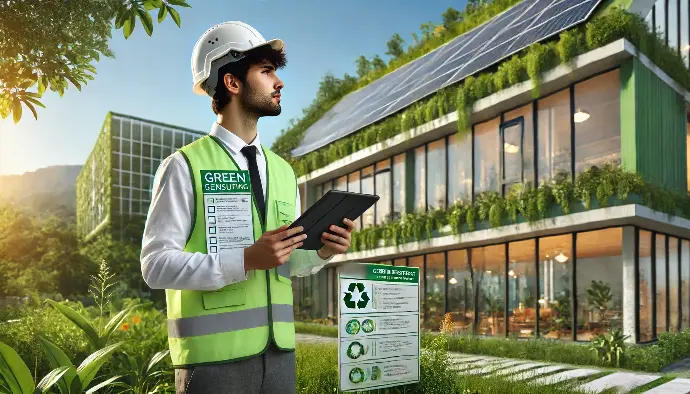Overview
Green building certifications in India, such as IGBC, GRIHA, and LEED, play a crucial role in promoting sustainable construction practices and reducing environmental impact. These certifications validate that buildings adhere to environmental standards, contributing to resource efficiency and sustainability. Compliance with ECBC standards and the use of BIS-certified products further enhance the sustainability and quality of building projects. By obtaining these certifications, developers can ensure their projects are environmentally responsible, resource-efficient, and sustainable, thus contributing to India's commitment to global environmental goals.
Green building certifications in India, such as IGBC, GRIHA, and LEED, play a crucial role in promoting sustainable construction practices and reducing environmental impact. These certifications validate that buildings adhere to environmental standards, contributing to resource efficiency and sustainability. Compliance with ECBC standards and the use of BIS-certified products further enhance the sustainability and quality of building projects. By obtaining these certifications, developers can ensure their projects are environmentally responsible, resource-efficient, and sustainable, thus contributing to India's commitment to global environmental goals.
IGBC Certification
The Indian Green Building Council (IGBC) is dedicated to promoting sustainable building practices across India. IGBC offers a range of certification programs for various building types, including residential, commercial, industrial, and institutional projects. These certifications focus on sustainability aspects such as site selection, water efficiency, energy efficiency, material selection, and indoor environmental quality. IGBC certifications are awarded at four levels: Certified, Silver, Gold, and Platinum, depending on the extent of compliance with the established standards.
Key Features of IGBC Certification:
- Sustainable Site Development: Emphasizes environmentally friendly site selection to minimize ecological impact and promote biodiversity.
- Water Efficiency: Certified buildings reduce water consumption through efficient plumbing fixtures, rainwater harvesting, and wastewater treatment.
- Energy Efficiency: Incorporates energy-saving measures such as solar power, energy-efficient lighting, and HVAC systems to reduce overall energy consumption.
- Material Selection: Encourages the use of sustainable and recycled materials to minimize the environmental footprint.
- Indoor Environmental Quality: Focuses on enhancing indoor air quality and thermal comfort to ensure occupant well-being.
Eligible Projects:
- Residential Buildings: Apartments, villas, and housing societies.
- Commercial Buildings: Office spaces, retail outlets, and shopping malls.
- Industrial Buildings: Factories, warehouses, and manufacturing units.
- Institutional Buildings: Schools, colleges, hospitals, and government buildings.
Benefits of IGBC Certification:
- Environmental Impact: Reduces carbon footprint and conserves natural resources.
- Economic Savings: Lowers operating costs through reduced energy and water consumption.
- Market Value: Enhances marketability by meeting international sustainability standards.
- Health and Well-being: Improves indoor air quality and comfort for occupants.
GRIHA
Green Rating for Integrated Habitat Assessment (GRIHA), developed by The Energy and Resources Institute (TERI) and endorsed by the Ministry of New and Renewable Energy (MNRE), evaluates the environmental performance of buildings throughout their lifecycle. GRIHA is suitable for various building types, including residential, commercial, and institutional projects. It emphasizes energy conservation, water management, waste management, and the use of sustainable building materials.
Key Features of GRIHA Certification:
- Lifecycle Assessment: Evaluates the environmental impact of buildings from construction to demolition.
- Energy Conservation: Encourages energy-efficient systems and renewable energy sources.
- Water Management: Promotes water-saving fixtures, rainwater harvesting, and greywater recycling.
- Waste Management: Focuses on reducing, reusing, and recycling construction and operational waste.
- Sustainable Materials: Encourages the use of locally sourced and sustainable building materials.
Eligible Projects:
- Residential Buildings: Single-family homes, multi-family apartments, and townhouses.
- Commercial Buildings: Office complexes, hotels, and mixed-use developments.
- Institutional Buildings: Universities, research centers, and healthcare facilities.
Benefits of GRIHA Certification:
- Sustainability: Ensures buildings are environmentally responsible throughout their lifecycle.
- Energy Efficiency: Reduces energy consumption and promotes renewable energy use.
- Water Conservation: Minimizes water usage through sustainable management practices.
- Waste Reduction: Encourages sustainable waste management and recycling.
- Regional Adaptability: Takes into account local environmental conditions and priorities.
LEED
Leadership in Energy and Environmental Design (LEED), administered by the U.S. Green Building Council (USGBC), is a globally recognized certification system that assesses the sustainability of buildings and communities. LEED certifications are available for multiple building types, including commercial, residential, and institutional structures. The certification levels include Certified, Silver, Gold, and Platinum, based on a point system evaluating energy efficiency, water use, indoor environmental quality, and materials selection.
Key Features of LEED Certification:
- Energy Efficiency: Reduces energy consumption through advanced building systems and renewable energy sources.
- Water Use: Encourages efficient water use and management practices.
- Indoor Environmental Quality: Enhances indoor air quality and occupant comfort through better ventilation and material selection.
- Materials Selection: Promotes the use of sustainable, recycled, and locally sourced materials.
- Sustainability Performance: Evaluates the overall sustainability performance of buildings and communities.
Eligible Projects:
- Commercial Buildings: Office buildings, retail spaces, and hotels.
- Residential Buildings: Apartments, single-family homes, and multi-family housing.
- Institutional Buildings: Schools, colleges, hospitals, and community centers.
Benefits of LEED Certification:
- Global Recognition: Provides international recognition for high environmental performance.
- Energy and Cost Savings: Reduces operational costs through energy and water efficiency.
- Market Advantage: Increases property value and marketability.
- Health and Productivity: Improves indoor air quality and occupant well-being.
ECBC
The Energy Conservation Building Code (ECBC), developed by the Bureau of Energy Efficiency (BEE), sets minimum energy performance standards for commercial buildings. Compliance with ECBC standards is crucial for achieving green building certification. ECBC focuses on optimizing energy performance through efficient building design and systems. It is mandatory for commercial buildings with a connected load of 100 kW or more.
Key Features of ECBC:
- Energy Performance Standards: Establishes minimum energy efficiency requirements for building systems and components.
- Efficient Design: Promotes energy-efficient design practices to reduce energy consumption.
- System Optimization: Encourages the use of energy-efficient HVAC, lighting, and electrical systems.
- Compliance: Ensures that new commercial buildings meet or exceed energy performance standards.
Eligible Projects:
- Commercial Buildings: Office buildings, shopping complexes, and hotels.
Benefits of ECBC Compliance:
- Energy Savings: Significantly reduces energy consumption and operational costs.
- Environmental Impact: Lowers greenhouse gas emissions and environmental footprint.
- Regulatory Compliance: Ensures adherence to national energy performance standards.
- Market Readiness: Prepares buildings for higher-level green building certifications.
BIS Certification
The Bureau of Indian Standards (BIS) offers certification for products and systems that comply with Indian standards. While BIS certification is not specific to buildings, it covers various construction materials and systems that contribute to the overall sustainability of a building project. BIS-certified products ensure quality and safety, supporting sustainable construction practices.
Key Features of BIS Certification:
- Quality Assurance: Ensures that construction materials and systems meet national standards for quality and safety.
- Sustainability Support: Promotes the use of certified products in sustainable building practices.
- Wide Applicability: Covers a broad range of building materials and systems.
Eligible Projects:
- All Building Types: Residential, commercial, and institutional buildings using BIS-certified materials.
Benefits of BIS Certification:
- Quality Control: Guarantees the quality and reliability of construction materials.
- Safety Assurance: Ensures that building systems are safe and compliant with national standards.
- Sustainability: Supports the use of environmentally friendly and sustainable materials.
- Regulatory Compliance: Ensures adherence to Indian standards for construction products.
FAQs
The Indian Green Building Council (IGBC) certification is a sustainability standard for buildings in India, focusing on criteria like site selection, water efficiency, energy efficiency, material selection, and indoor environmental quality. IGBC certifications are available for various building types, including residential, commercial, industrial, and institutional projects, and are awarded at Certified, Silver, Gold, and Platinum levels based on compliance.
Green Rating for Integrated Habitat Assessment (GRIHA) certification is suitable for residential, commercial, and institutional buildings. It evaluates the environmental performance of buildings throughout their lifecycle, emphasizing energy conservation, water management, waste management, and the use of sustainable building materials.
Leadership in Energy and Environmental Design (LEED) certification benefits building projects by enhancing energy efficiency, reducing water use, improving indoor environmental quality, and promoting the use of sustainable materials. LEED-certified buildings gain global recognition, reduce operational costs, increase property value, and contribute to occupant health and productivity.
The Energy Conservation Building Code (ECBC) sets minimum energy performance standards for commercial buildings. Key features include energy performance standards, efficient design practices, and system optimization for HVAC, lighting, and electrical systems. ECBC compliance is mandatory for commercial buildings with a connected load of 100 kW or more, ensuring energy savings and regulatory adherence.
The Bureau of Indian Standards (BIS) certification covers various construction materials and systems, ensuring they meet national standards for quality and safety. While not specific to buildings, BIS-certified products contribute to the overall sustainability of green building projects by supporting quality control and safety assurance.
Water efficiency is crucial in green building certifications because it helps reduce water consumption, promote sustainable water management practices, and lower utility costs. Efficient plumbing fixtures, rainwater harvesting, and wastewater treatment are common features in certifications like IGBC, GRIHA, and LEED.
Green building certifications positively impact the environment by promoting sustainable construction practices, reducing carbon footprints, conserving natural resources, and enhancing energy and water efficiency. Certifications like IGBC, GRIHA, and LEED ensure buildings adhere to high environmental standards, contributing to overall sustainability.
Yes, existing buildings can obtain green building certifications. Programs like IGBC, GRIHA, and LEED offer certification options for existing buildings, focusing on retrofitting and upgrading systems to meet sustainability standards, improve energy and water efficiency, and enhance indoor environmental quality.
LEED certification is awarded at four levels: Certified, Silver, Gold, and Platinum. These levels are based on a point system evaluating energy efficiency, water use, indoor environmental quality, materials selection, and overall sustainability performance. Higher levels indicate greater compliance with LEED standards.
IGBC certification enhances market value by meeting international sustainability standards, reducing operational costs through energy and water efficiency, and improving the overall environmental performance of buildings. Certified buildings are more attractive to buyers and tenants, increasing property value and marketability.

